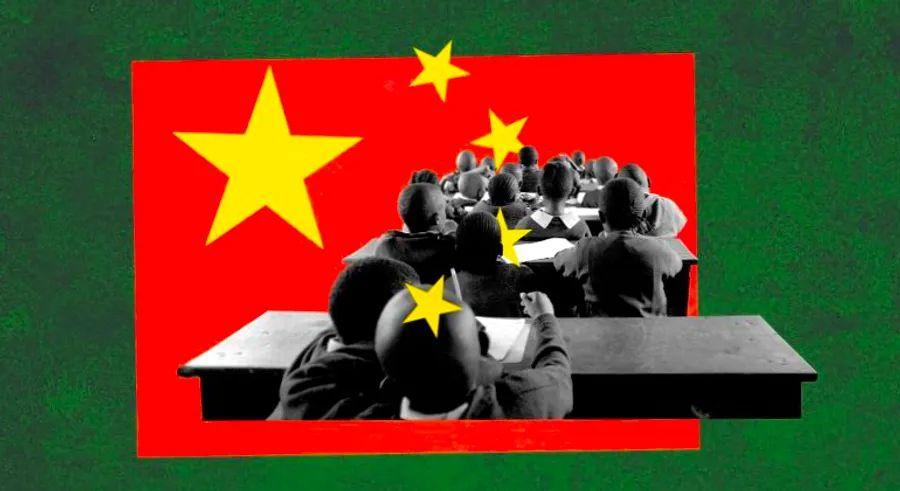China’s influence continues to grow in Africa as a rising number of young people take up Mandarin as their second language

In a well-lit classroom, approximately 20 children joyfully belt out the Chinese national anthem.
Following that, they sing another Chinese song – one traditionally performed during the Lunar New Year celebrations.
However, this isn’t happening in China, but at Lakewood Premier School, located thousands of miles away in Nairobi.
At this school, children are mastering Mandarin, a language spoken by nearly one billion people, almost 8,000 kilometers from their homeland.
Sandra Wanjiru, 13, is among the growing number of African students who are mastering the Chinese language with increasing skill.
In 2020, even more students will join the ranks as Mandarin is officially introduced in all Kenyan schools, alongside French, Arabic, and German, which are already part of the curriculum.
Lakewood Premier School, where Wanjiru studies, has started the program a year ahead of schedule to give its students an early advantage.
“I decided to learn Chinese because it’s fascinating to study a foreign language, and I hope to travel and do business in China,” said Wanjiru.
Julius Jwan, CEO of the Kenya Institute of Curriculum Development (KICD), told Chinese state-run Xinhua News Agency: “China’s position in the global economy has grown so strong that Kenya stands to gain if its citizens can speak Mandarin.”
China’s increasing influence across Africa
Over the past 20 years, China has steadily grown more powerful and visible throughout Africa.
Kenya is not the only nation teaching its youth Mandarin; in South Africa, Mandarin has been an elective language for students since 2014, and in December 2018, Uganda began offering Mandarin to secondary students in select schools.
Henry Adramunguni, a curriculum expert at Uganda’s National Curriculum Development Centre, explained that Mandarin was added to the curriculum as it is one of the official working languages of the United Nations. Ugandan students also have the option to study French, Arabic, Latin, or German.
“Our goal is to give young Ugandans access to better job opportunities, education, and business prospects outside our country. That’s why we’ve made learning Chinese available to them,” he said.

Instructors in the program received training from tutors at the Confucius Institute, a non-profit organization dedicated to spreading Chinese language and culture globally.
Confucius opened its first African branch at the University of Nairobi in 2005 and has since expanded to 48 centers across the continent.
These centers are managed by Hanban (the Office of Chinese Language Council International) and receive partial funding from the Chinese government and the universities that host them.
China is second only to France in the number of cultural institutions in Africa, a significant achievement considering China has no colonial history with any African country, unlike France and the UK, which have historically used cultural organizations like the Institut Français and the British Council to extend their influence.
The ongoing growth of Chinese cultural institutions across Africa is part of China’s broader strategy to enhance its influence on the continent through ‘soft power,’ according to Ilaria Carrozza, a researcher specializing in China-Africa relations at the London School of Economics and Political Science.
Carrozza explains that China aims to increase its global appeal and influence by promoting the study of its language, strengthening its soft power in the process.
“Soft power, when successful, can lead to significant influence – it’s more than mere power, functioning through persuasion and attraction,” Carrozza stated.
She also pointed out that African governments view the introduction of Mandarin and Chinese cultural institutes as a strategic investment in the future of their youth.
“African governments believe that incorporating Mandarin into school curricula will help create a future workforce with better job opportunities, either in China or with Chinese companies operating across the continent,” she said.
Concerns about Confucius Institutes
Despite the potential benefits, Carrozza cautioned that African governments should monitor these institutes carefully, especially in light of recent closures in the US due to concerns about Chinese Communist Party interference.
The University of North Florida became one of several American universities to terminate its partnership with the Confucius Institute, stating that the center’s activities no longer aligned with the institution’s objectives.
This decision was praised by US Senator Marco Rubio, a prominent critic of the Confucius Institutes.
“While avoiding a witch-hunt, African governments and institutions must carefully evaluate each case individually,” Carrozza stated.
China’s Foreign Ministry has denied allegations that the government interferes in the management of Confucius Institutes.
Ministry spokesperson Lu Kang stated during a media briefing in Beijing in February: “All Confucius Institutes in the US are established jointly with American universities based on voluntary agreements and guided by principles of mutual respect, friendly consultation, equality, and mutual benefit between Chinese and American institutions.”
The introduction of Mandarin in Kenya has not been universally accepted.
Wycliffe Omucheyi, chair of the Kenya National Union of Teachers (KNUT), expressed concerns that the government is rushing into the program. He argued that, instead of Mandarin, students should be taught native African languages.
“The government should prioritize developing classes for local languages before introducing a foreign language like Mandarin,” Omucheyi said.
Despite these objections, Russell Kaschula, a professor of African Language Studies at Rhodes University in South Africa, argued that it would be shortsighted for Africans to ignore Mandarin, given China's status as a key trading partner for many African countries.
“Learning Mandarin is as essential today as learning English, French, and Portuguese was in the 19th century, when colonial powers imposed their languages on Africa,” he remarked.
Kaschula pointed out that Africans often learn new languages out of necessity, and as long as foreign languages remain optional, including them in school curricula isn’t an issue.
“Nelson Mandela once learned Afrikaans to better understand the Afrikaner oppressors,” he added.
“Similarly, I believe that learning Mandarin is a logical choice for Africans,”

1

2

3

4

5
Evaluation :
5/5